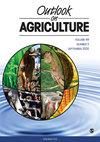COVID-19 对印度农业食品系统和恢复途径的性别影响:系统回顾
IF 2.6
3区 经济学
Q1 AGRICULTURE, MULTIDISCIPLINARY
引用次数: 0
摘要
农业部门对粮食安全和经济稳定至关重要,尤其是在印度等发展中国家,在 COVID-19 大流行期间,农业部门面临严重破坏。影响包括劳动力短缺、市场准入受限、供应链中断以及由于流动性限制造成的易腐物品浪费。虽然许多研究都探讨了这些对印度的影响,但在了解印度国内的性别动态如何加剧这些脆弱性方面仍存在明显差距。本综述综合了 32 项研究的结果,揭示了性别与大流行病对印度农业食品系统影响的交叉点。研究结果表明,以性别为中心的有关 COVID-19 对印度农业影响的研究明显不足,许多研究还受到地域限制。在考虑性别问题时,很少有人将其作为一种社会建构角色进行批判性研究,往往将其简化为一个单纯的变量。女性农民受制于社会规范,如缺乏土地权和获得资源的机会有限,承受着更明显的负面影响。她们在有偿就业中的参与度下降,家庭粮食安全也随之降低。此外,印度妇女还面临着家务负担加重、家庭暴力风险增加和健康挑战。值得注意的是,目前的研究缺乏对印度大流行后农村妇女长期经济复苏的关注,也缺乏对不同性别类别影响的探索。未来在印度开展的研究必须采用纵向、交叉的视角,结合定性和定量的方法,以充分把握和解决在后 COVID-19 时代背景下农业食品行业中这些持久的性别影响。本文章由计算机程序翻译,如有差异,请以英文原文为准。
Gendered impacts of COVID-19 in agri-food system and recovery pathways in India: A systematic review
The agricultural sector, essential for food security and economic stability, especially in developing countries such as India, faced significant disruption during the COVID-19 pandemic. Impacts included labour shortages, limited market access, disrupted supply chains and wasted perishable goods due to mobility restrictions. While many studies have addressed these effects in India, a conspicuous gap remains in understanding how gender dynamics intensify these vulnerabilities within the country. This review synthesises findings from 32 studies, shedding light on the intersection of gender and the pandemic's influence on India's agri-food system. Results revealed a noticeable underrepresentation of gender-centric research on COVID-19's agricultural impacts in India, with many studies being geographically limited. When gender was considered, few critically examined it as a socially constructed role, often reducing it to a mere variable. Women farmers, constrained by societal norms like lack of land rights and limited access to resources, endured more pronounced negative effects. Their participation in wage employment dropped, and household food security dwindled. Furthermore, women in India faced augmented domestic burdens, heightened domestic violence risks and health challenges. Notably absent from current research is a focus on the long-term economic recuperation of rural women post-pandemic within the Indian context and an exploration of varied gender-category impacts. Future research in India must adopt a longitudinal, intersectional lens, combining qualitative and quantitative methodologies, to fully grasp and address these enduring gendered ramifications in the agri-food sector in the post-COVID-19 context.
求助全文
通过发布文献求助,成功后即可免费获取论文全文。
去求助
来源期刊

Outlook on Agriculture
农林科学-农业综合
CiteScore
5.60
自引率
13.30%
发文量
38
审稿时长
>36 weeks
期刊介绍:
Outlook on Agriculture is a peer reviewed journal, published quarterly, which welcomes original research papers, research notes, invited reviews and commentary for an international and interdisciplinary readership. Special attention is paid to agricultural policy, international trade in the agricultural sector, strategic developments in food production, the links between agricultural systems and food security, the role of agriculture in social and economic development, agriculture in developing countries and environmental issues, including natural resources for agriculture and climate impacts.
 求助内容:
求助内容: 应助结果提醒方式:
应助结果提醒方式:


